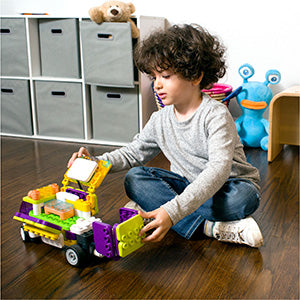Why Should We Teach Children Coding in Early Childhood?
Why Should We Teach Children Coding in Early Childhood?
Coding is a necessity in today's tech-savvy world, not to mention it's a great skill to have. It'll help improve reasoning skills and thinking, as well as problem-solving. Essentially, it teaches children to be innovative and independent thinkers, sparking creativity that will make them good team players later in life.
5 Reasons Kids Should Learn to Code
Why learn to code? It's a hot topic in the education world, but there are plenty of practical reasons for kids to learn how to program. Here are five reasons why kids should learn to code:
- Coding is not just for coders anymore.
- Coding helps develop analytical skills.
- It's fun!
- Learning to code will help kids think creatively and develop problem solving skills.
- Kids who learn to code gain a real sense of accomplishment from creating something all on their own.
Coding nurtures problem-solving skills, logic and creativity. By starting early, students will have a foundation for success in any 21st-century career path.
Research shows coding is vital for the jobs of tomorrow, with experts predicting that three out of five STEM jobs will be in computing. Unfortunately, only 25% of K–12 schools teach computer science. Kids that master robot education coding will be able to build all kinds of programs that can only be imagined today.
- They Learn Valuable Skills
Coding teaches kids valuable skills that can help them succeed in life. Programming isn’t just about building mobile apps or designing video games; it’s also an exercise in problem solving and critical thinking. Kids who learn how to code will develop their ability to understand complex processes and have better chances at academic success later on in life — even if they end up pursuing careers outside of technology down the line.
Learning some basic coding skills is a good way for children to get a head start on future careers. The world today depends on technology, so it's good for kids to understand how computers work and how they can use them to solve problems and create things.
- They Learn Other Languages Easier
When learning a new language, children start with their own. We begin to build vocabulary and grammar rules naturally based on the words we hear around us. As our vocabulary grows, we learn about syntax, which is a fancy word for how to put things together in a sentence.
Children can learn a second language much more easily than adults. This is because kids' brains are very open to new information. Their brains grow and develop according to the information they receive from their surroundings. If they are exposed to two languages at the same time, their brains will create a neural pathway for each one.
The main difference between computer programming and our everyday conversations is that we don't use commas or periods in coding. Instead, programmers use indents or tabs to tell the computer where one line of code ends and another begins. Think about it this way: Where it might seem intuitive for us to indent a paragraph when writing an essay, the computer can understand only if you specifically tell it what you mean by that indentation.
Learning coding early makes it easier to pick up new languages later on. And it allows children to develop the skills to create their own games and apps, rather than just passively playing them. Kids love playing video games and apps on their mobile devices. Games that use programming concepts can make learning fun and interactive.
- They’ll Be Prepared for the Future
Coding teaches logic and how to break problems down into simple steps. It teaches them the basics of computational thinking, which is a set of problem-solving skills that includes pattern recognition, breaking problems down into smaller parts, data representation and abstraction and algorithms. These skills are vital for the modern world because all jobs today are related to technology.
- They’re Never Too Young To Learn
Children can start learning to code at any age. There are even coding toys made for toddlers, so if they're not ready for a keyboard yet, they can start with something simpler like a building block or logic puzzle. Robot education coding can prepare kids for jobs in engineering, robotics, and advanced technology.
Children who understand coding concepts will become leaders in the field of computer science, as well as other disciplines that involve technology such as business management or engineering.

Coding doesn’t necessarily have to be a difficult concept. The fact of the matter is, coding can be just as easy, even fun, for kids as it is for adults—but it does require a bit of time and effort from parents. It’s important to expose them to early on so that they will continue to learn and flourish in the future. These skills prepare children for a world of ever-changing technology, and will equip them with valuable life skills for years to come.
